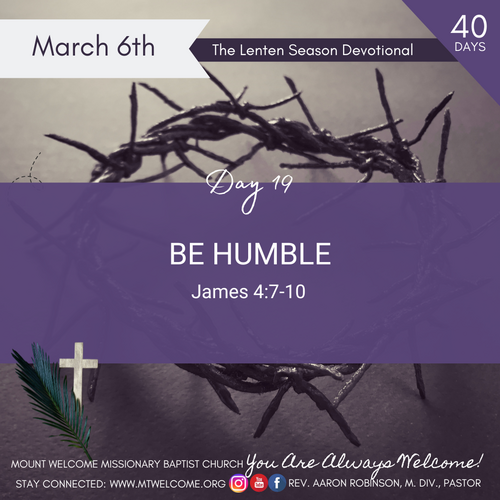Be Humble

Be Humble: One of Momma’s Lessons to Me || James 4:7-10 || Bro. Sevé Adigun
One of the greatest lessons my mother taught me was to remain humble. Being a consummate reader of scripture, she was truly aware of the importance of the notion of being humble.
Throughout her 81 years, there were constant reminders to me not to give in to selfishness or earthly desires. Through her actions and through her words, my mother came to understand and master the necessity of humility and staying humble (remaining selfless so that God’s will can be enacted). I’ve had a more challenging time achieving such grace. I guess Lent would be the ideal time for me to practice such selflessness, to be humble.
While the practice of Lent would not come about until well after the text was written, some several hundred years later during the Nicaea Conference of 325 AD, this scripture seems to encapsulate the essence of the modern Lenten tradition. Lent focuses on righteous decisions, selflessness, sacrifice, transformation, and the reward that comes with such perseverance.
As we observe Lent, we are asked to make decisions, to sacrifice things of pleasure or not to act in an ungodly way. This usually creates conflict within us. This conflict derives from selfishness. Selfishness is the root of individualism. Individualism is usually an inability to make righteous, selfless decisions, that is making God-centered decisions. It is when the ego takes over making it hard to hear from God or make manifest God’s will. Denying individualism is the beginning of the change process, thus the beginning of our Lenten journey. Our 40-days of sacrifice should be reflective and indicative Jesus’ triumphant experience in the wilderness after his baptism.
The scripture begins by stating the need to submit ourselves to God and to resist the devil or those decisions that we know are not righteous. Jesus’ wilderness journey saw him wrought with overcoming Satan’s propositions. It was Jesus’ selflessness, his denial of individualistic gains, that allowed him to refuse the devil’s three temptations and come through the wilderness experience better prepared to assume the task of leading the children of Israel (Matt. 4; Mark 1; Luke 4).
The scripture also asks that we draw nearer to God and that we cleanse ourselves. That is to say that we should offer penance for our wrong doings. Lent allows of us the opportunity to bear witness to our sins and shortcomings and recognize our inability to succeed throughout Lent if God is not at the center of our decisions.
The text closes by instructing us to be/stay humble. Being humble during Lent means that we graciously accept the mission of sacrifice, and we willfully draw upon God’s awesome power to endure the challenges of sacrifice. It does not mean that we go around broadcasting to others about our sacrifice in hopes of obtaining praise or sympathy from others. But rather, we should humbly go about our lives as though nothing had changed with the anticipation of the real change, the real reward to come at the end of the Lenten process. Being humble is one of the many facets associated with the rejection of individualism.
Be humble. While they are only two words, they bring the promise of exaltation from God.
In retrospect, this was truly one the sweetest lessons that my mother always tried to teach me. Be humble. Reject individualism. God’s reward is always worth the wait.
One of the greatest lessons my mother taught me was to remain humble. Being a consummate reader of scripture, she was truly aware of the importance of the notion of being humble.
Throughout her 81 years, there were constant reminders to me not to give in to selfishness or earthly desires. Through her actions and through her words, my mother came to understand and master the necessity of humility and staying humble (remaining selfless so that God’s will can be enacted). I’ve had a more challenging time achieving such grace. I guess Lent would be the ideal time for me to practice such selflessness, to be humble.
While the practice of Lent would not come about until well after the text was written, some several hundred years later during the Nicaea Conference of 325 AD, this scripture seems to encapsulate the essence of the modern Lenten tradition. Lent focuses on righteous decisions, selflessness, sacrifice, transformation, and the reward that comes with such perseverance.
As we observe Lent, we are asked to make decisions, to sacrifice things of pleasure or not to act in an ungodly way. This usually creates conflict within us. This conflict derives from selfishness. Selfishness is the root of individualism. Individualism is usually an inability to make righteous, selfless decisions, that is making God-centered decisions. It is when the ego takes over making it hard to hear from God or make manifest God’s will. Denying individualism is the beginning of the change process, thus the beginning of our Lenten journey. Our 40-days of sacrifice should be reflective and indicative Jesus’ triumphant experience in the wilderness after his baptism.
The scripture begins by stating the need to submit ourselves to God and to resist the devil or those decisions that we know are not righteous. Jesus’ wilderness journey saw him wrought with overcoming Satan’s propositions. It was Jesus’ selflessness, his denial of individualistic gains, that allowed him to refuse the devil’s three temptations and come through the wilderness experience better prepared to assume the task of leading the children of Israel (Matt. 4; Mark 1; Luke 4).
The scripture also asks that we draw nearer to God and that we cleanse ourselves. That is to say that we should offer penance for our wrong doings. Lent allows of us the opportunity to bear witness to our sins and shortcomings and recognize our inability to succeed throughout Lent if God is not at the center of our decisions.
The text closes by instructing us to be/stay humble. Being humble during Lent means that we graciously accept the mission of sacrifice, and we willfully draw upon God’s awesome power to endure the challenges of sacrifice. It does not mean that we go around broadcasting to others about our sacrifice in hopes of obtaining praise or sympathy from others. But rather, we should humbly go about our lives as though nothing had changed with the anticipation of the real change, the real reward to come at the end of the Lenten process. Being humble is one of the many facets associated with the rejection of individualism.
Be humble. While they are only two words, they bring the promise of exaltation from God.
In retrospect, this was truly one the sweetest lessons that my mother always tried to teach me. Be humble. Reject individualism. God’s reward is always worth the wait.
Recent
Archive
2025
March
Come Rest A WhileWalking With The ShepherdIn God's PresenceGetaway With GodResting Like GodGod Gives The RestBe StillForgetting The RestPath To HappyDon't Worry About A ThingCloser Than CloseConnectReconciledSaved By DeathWhat A FellowshipNear To TheeListening To ChristHelp My UnbeliefExample of ChristWe Need IncreaseTransformed into Something NewFaith SightedSeasoning a Bland World
2024
February
March
Thank You FatherConfidentA Keep-Pushing ThankfulnessMove In HumilityAct In HumilityBe HumbleThe Humble Will Be ExaltedHumble OurselvesA Just RewardIt Is GoodGod Knows MeGod Is With MeGod Made MeCreated By GodPurposedTrusting God's LeadershipTeach Me and Lead MeSearch Me GodWhich Way God?Guide MeA Liberating LightDivine DiscontentBe FruitfulActing for GodThe GreatestIt Is What It IsThe Borrowed Tomb
September
December

No Comments